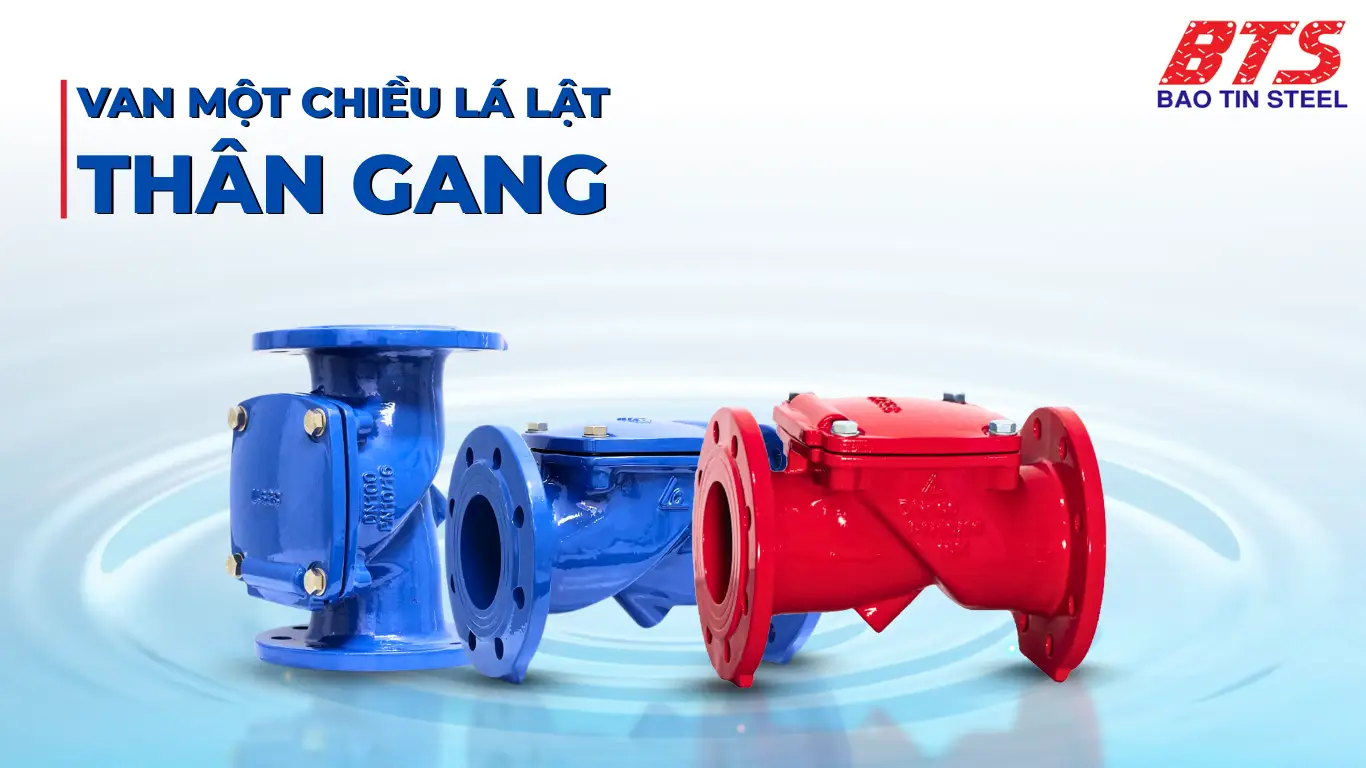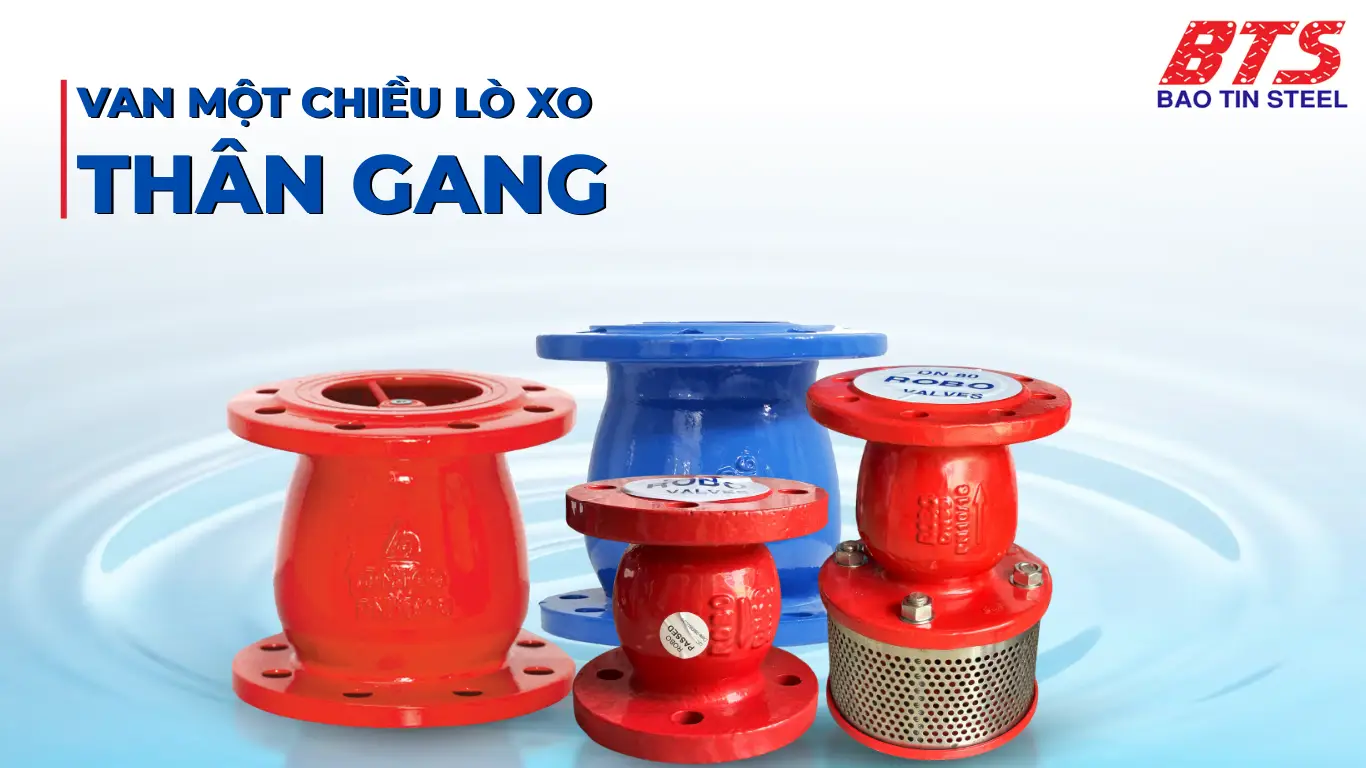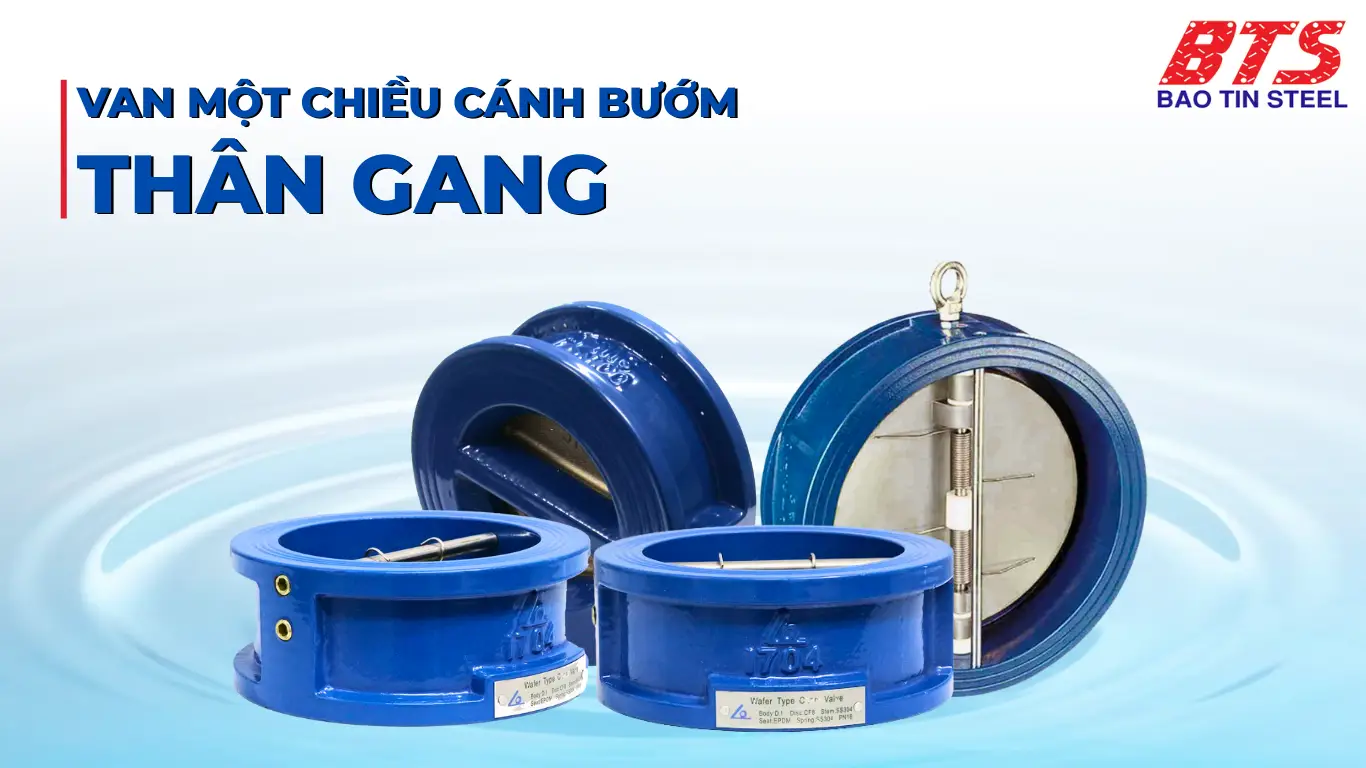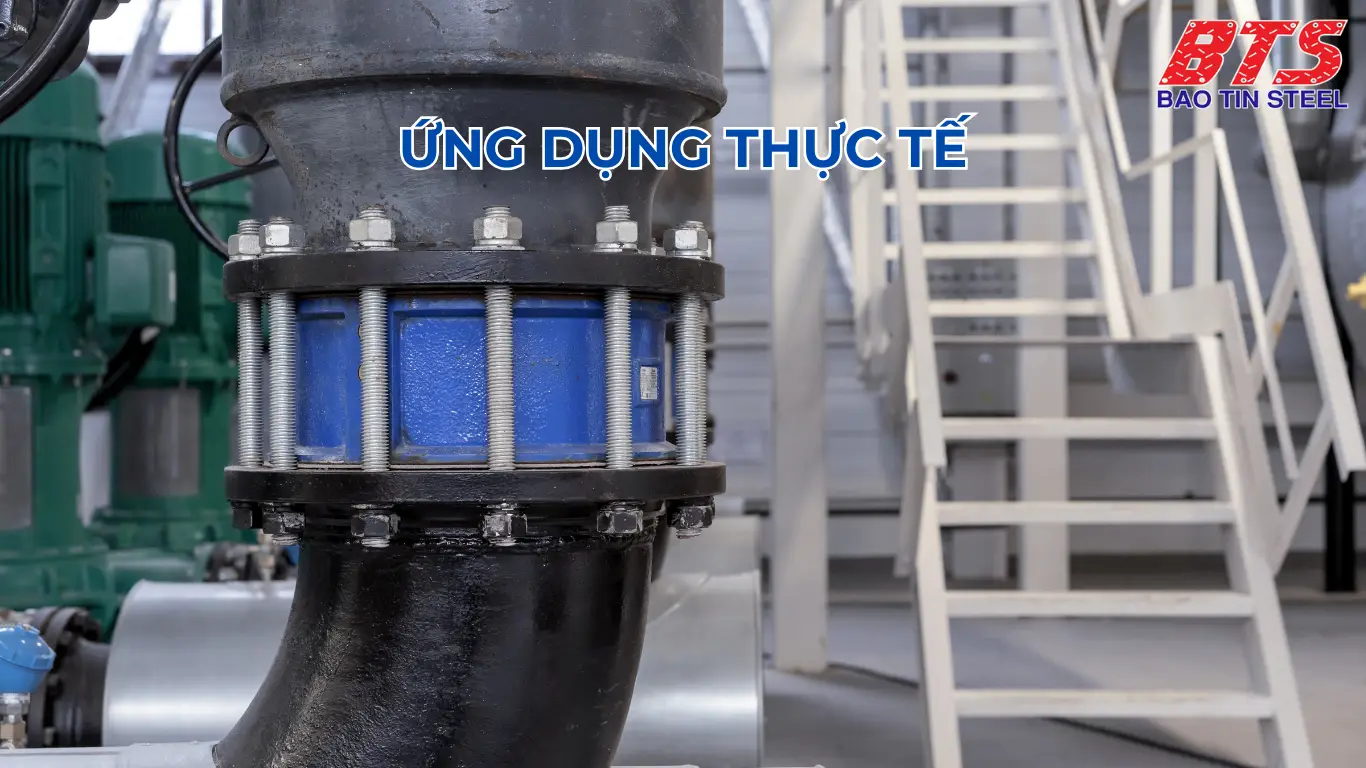A cast iron check valve is a type of industrial valve made from cast iron, designed to ensure that the flow moves in only one direction, preventing backflow that could cause damage to pumps, equipment, or even an entire complex operating system.
What makes cast iron check valves particularly popular is their balance between high mechanical strength, with excellent heat and pressure resistance, and an affordable price. Thanks to these advantages, cast iron valves have become one of the top choices for both civil and industrial applications in Vietnam.
Types of Cast Iron Check Valves: Which One Is Right for You?
Based on their operating mechanism, cast iron check valves are manufactured in various types to meet the different technical requirements of each system. Below are the most common types that you can easily find in many construction and industrial applications:
Swing Check Valve

Swing Check Valve
This type of valve features a disc shaped like a flap, connected to the valve body by a hinge pin. When the flow passes through, the disc swings upward to allow the fluid to flow. Once the flow stops, the disc automatically swings back down by gravity, sealing the valve shut.
- Advantages:
Swing check valves have a simple design with fast and accurate opening and closing action. They create minimal flow resistance when fully open, helping maintain flow rate and reduce pressure loss. - Disadvantages:
They are prone to water hammer and can generate significant noise when closing suddenly.
=> Learn more: What is a check valve? Structure, principle and installation
Spring Check Valve

Spring Check Valve
In this type of valve, the disc is attached to a spring. The valve opens when the flow pressure is strong enough to overcome the spring’s tension. When the pressure drops, the spring contracts, pushing the disc back into the closed position.
- Advantages:
Spring check valves offer quick and efficient closure, effectively preventing water hammer. They can be installed in both horizontal and vertical pipelines. - Disadvantages:
The spring mechanism creates an initial resistance due to compression, causing a slight pressure drop as the fluid passes through. Over time, the spring may become weakened or deformed, reducing the valve’s sealing performance and potentially leading to leakage.
=> See more: What is a Spring Check Valve? Classification, Applications and How to Choose
Butterfly Check Valve

Butterfly Check Valve
The butterfly check valve has a compact design, featuring two semicircular discs (“butterfly” plates) mounted on a central shaft. It is installed between two flanges on the pipeline. When fluid flows through, the pressure pushes the discs open, and when the flow stops, the spring mechanism closes the discs to prevent backflow.
Advantages:
- Compact and lightweight design
- Low cost, easy to install and maintain
Disadvantages:
-
The valve discs remain in the flow path, which can cause a pressure drop and less-than-optimal flow compared to swing check valves
Advantages and Disadvantages of Cast Iron Check Valves
Cast iron, with its durability and ability to withstand high temperatures and pressures, offers an optimal solution for many applications. However, like any material, cast iron valves have their own advantages and disadvantages that should be carefully considered before making a selection.
Outstanding Advantages of Cast Iron Check Valves
- High Durability: Cast iron check valves are made from high-quality materials such as grey iron, ductile iron, and malleable iron, offering excellent mechanical strength and impact resistance. Some models are coated with epoxy to prevent corrosion and extend service life.
- Affordable Price: Compared to stainless steel or brass valves, cast iron valves are much more cost-effective, helping reduce initial investment costs for large-scale projects.
- High Temperature Resistance: Cast iron valves can operate over a wide temperature range, from -10°C to 180°C. Some specialised steam cast iron check valves can withstand temperatures up to 450°C.
- Variety of Types: Cast iron valves are available in multiple sizes and connection types (such as flanged cast iron check valves), providing flexibility to meet the technical requirements of various piping systems.
Limitations to Consider
- Heavy Weight: Cast iron valves are relatively heavy, making transportation and installation challenging, especially in high or hard-to-reach locations.
- Environmental Limitations: Although coated with epoxy to prevent rust, cast iron valves are still susceptible to corrosion from strong chemicals, acids, or marine environments.
- Risk of Water Hammer: Some types of cast iron check valves, particularly swing check valves, are prone to water hammer and significant noise when closing suddenly. This occurs due to the reverse pressure of the fluid impacting the valve disc, which can potentially damage both the valve and other system equipment.
Common Applications of Cast Iron Check Valve
Thanks to their durability, high-pressure resistance, and affordable cost, cast-iron check valves are widely used in various industrial sectors as well as in everyday life:
- Water Supply and Wastewater Treatment Systems
- Fire Protection Systems (Firefighting and Sprinkler Systems)
- Steam and Compressed Air Industries

In addition, cast iron check valves are also used in a variety of other systems, such as:
- Irrigation and Agricultural Systems
- Heating, Ventilation, and Air Conditioning (HVAC) Systems
- Manufacturing Plants, Power Plants, and Chemical Facilities
Latest Cast Iron Check Valve Prices – 2025
The price of cast iron check valves varies based on factors such as size, valve type (swing, spring-loaded, butterfly), brand, and origin. Below is a reference price table to give you an overview:
| Size (DN) | Swing Check Valve (South Korea) | Butterfly Check Valve (South Korea) | Spring-Loaded Check Valve (China) |
|---|---|---|---|
| DN50 | ~780,000 VND | ~490,000 VND | ~260,000 VND |
| DN65 | ~950,000 VND | ~520,000 VND | ~280,000 VND |
| DN80 | ~1,250,000 VND | ~630,000 VND | ~340,000 VND |
| DN100 | ~1,950,000 VND | ~850,000 VND | ~400,000 VND |
| DN150 | ~2,950,000 VND | ~1,550,000 VND | ~730,000 VND |
Note: The above prices are for reference only and may vary depending on the time of purchase and the order quantity.
If you need to purchase valves for your project, please contact Thép Bảo Tín directly to receive an accurate quotation, volume discounts, and full CO-CQ certification.
Bao Tin Steel – A Trusted Supplier of Industrial Valves and Piping Materials in Ho Chi Minh City
When choosing cast iron check valves, finding a reputable supplier is crucial. While low-cost valves from certain markets may seem attractive, investing in high-quality products from well-established brands offers long-term benefits in terms of safety and operational costs for your business.
In Ho Chi Minh City, Bao Tin Steel Co., Ltd. is a trusted partner for many contractors and businesses, thanks to:
- Wide Product Range: Offers a full selection of cast iron check valves (swing, spring-loaded, butterfly, flanged) along with various other valves and fire protection (PCCC) accessories.
- Genuine Products: Guarantees products meet JIS, DIN, and ANSI standards, complete with CO-CQ certificates and inspection documents.
- Professional Technical Consultation: The Technical team guides you in selecting the right valves for your system, helping you avoid waste and potential future issues.
- Competitive Prices & Fast Delivery: Transparent pricing with numerous incentives for distributors and large projects. Delivery support is available within Ho Chi Minh City and the surrounding provinces.
- Project Partnership: Beyond sales, Bao Tin Steel also provides consulting to optimise piping material solutions for each project.
If you need in-depth advice on cast iron check valves, such as swing check valves, spring-loaded check valves, or butterfly check valves with cast iron bodies, don’t hesitate to contact Bao Tinn Steel for support and the best quotations.


 Tiếng Việt
Tiếng Việt ភាសាខ្មែរ
ភាសាខ្មែរ